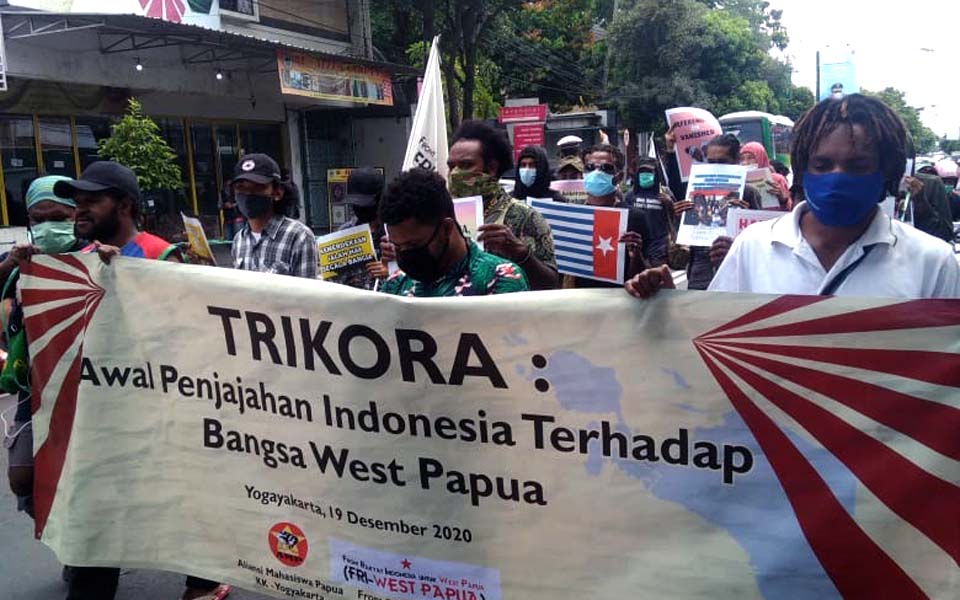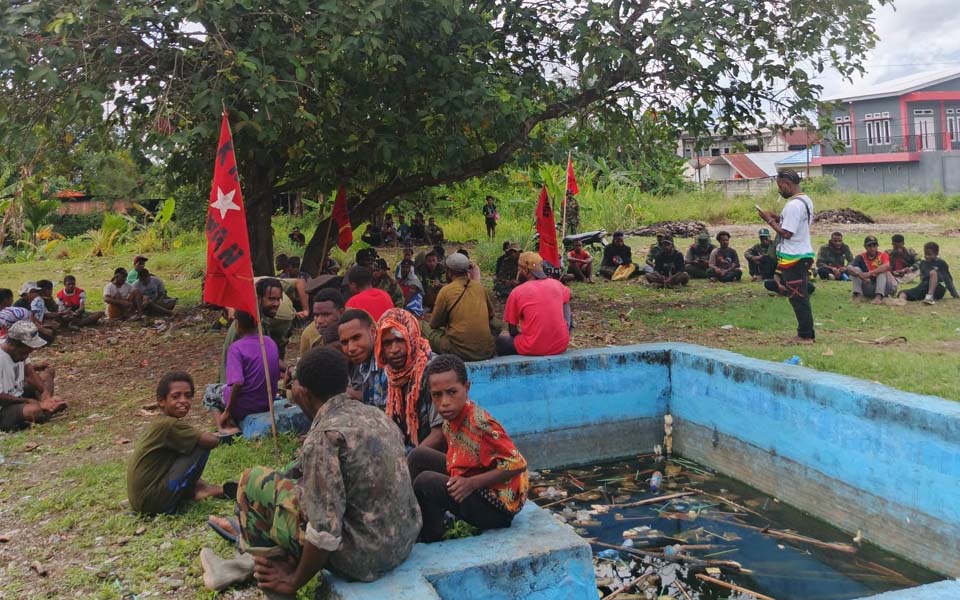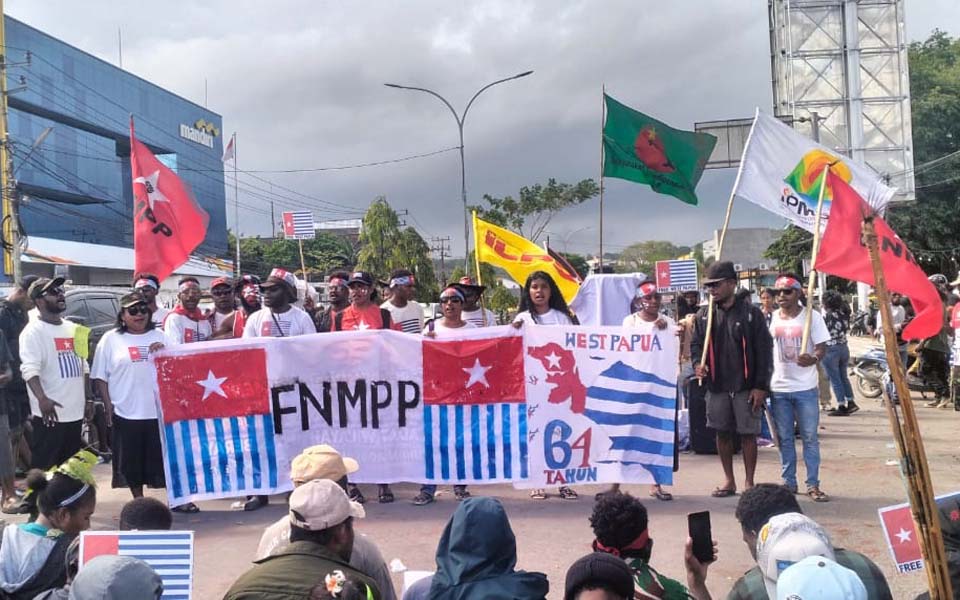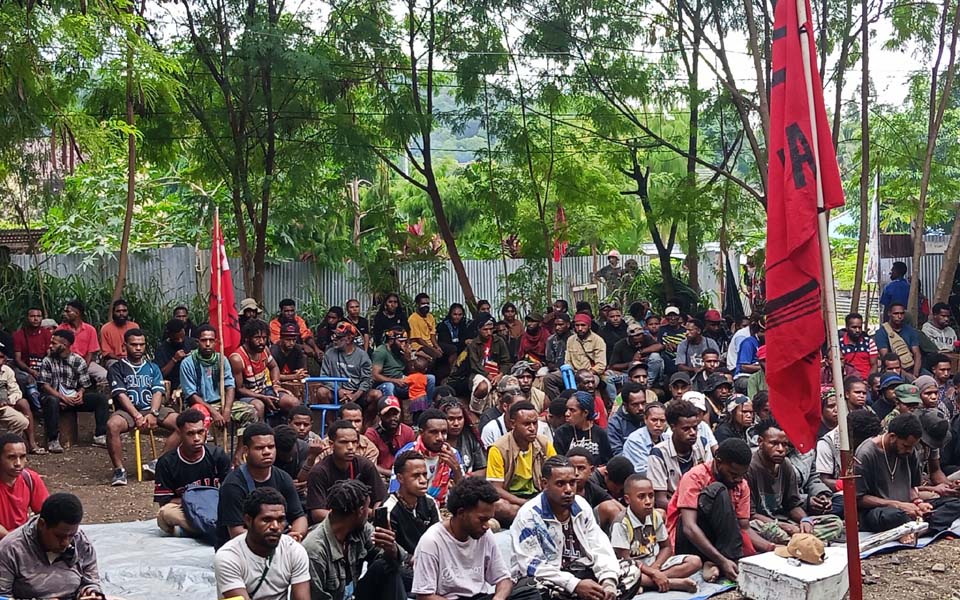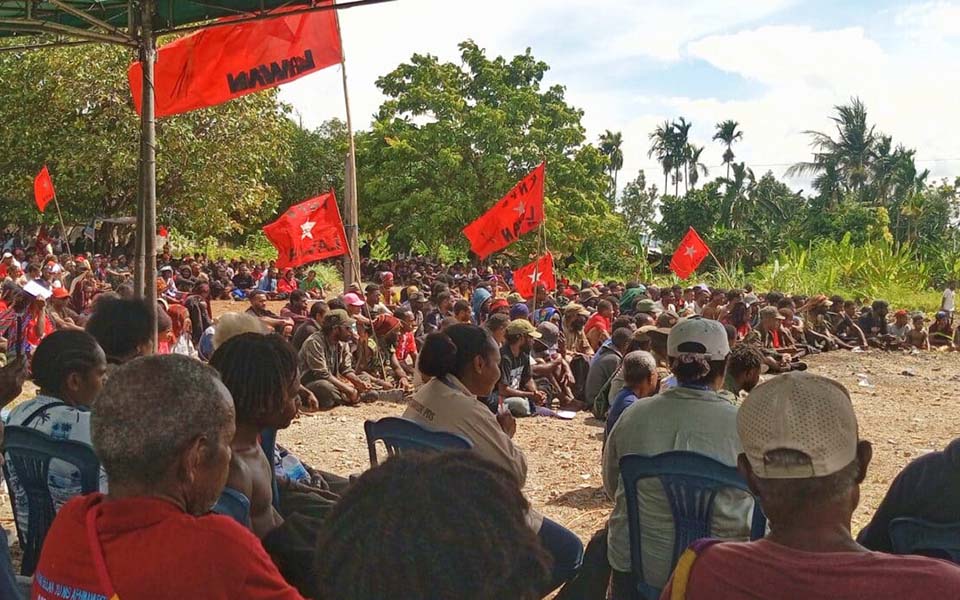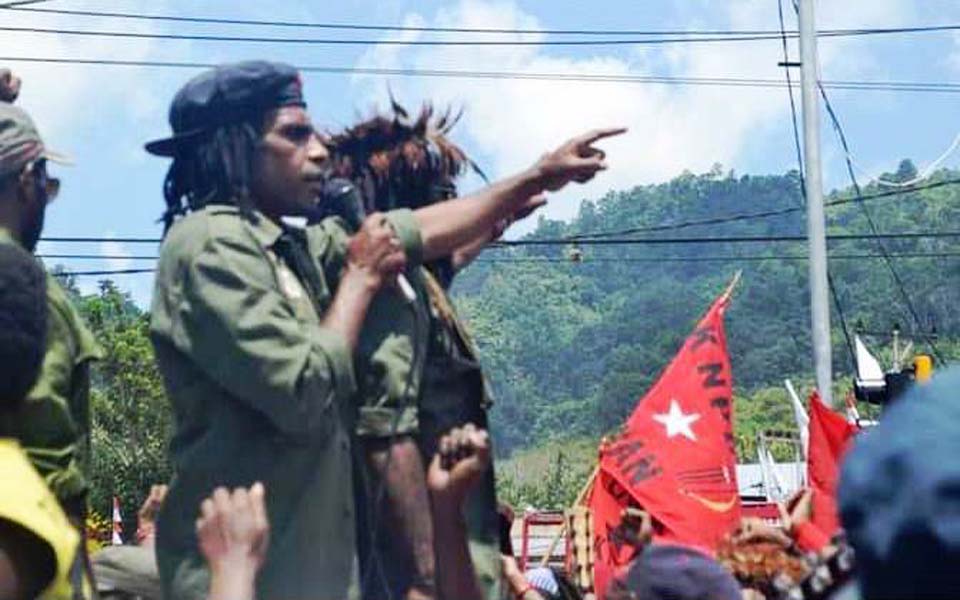The Indonesian People's Front for West Papua (FRI-WP) and the Papuan Student Alliance (AMP) again launched actions in several parts of the country on December 19. This time the actions took up the theme, "Trikora: The Start of Indonesia's Colonisation of the West Papua Nation".
Jakarta
In Jakarta, around 50 protesters from the AMP, the FRI-WP and the Papuan Central Highlands Indonesian Student Association (AMPTPI) gathered at the Horse Statue in Central Jakarta at 11.30 am. While the demonstrators were in the process of getting ready, security personnel began harassing them.
"A new regulation is now in force. Anyone who wants to hold an action must take a [Covid-19] rapid test. If not, we will be forced to close down the action! We even dispersed the FPI [Islamic Defenders Front]!", shouted one of the police officers.
The action coordinator along with several protesters then went to a rapid test post to ask the staff if they had a government document to this effect from the Covid-19 Task Force. It turned out however that they did not.
Following this, 15 people from a reactionary group arrived holding banners and nationalist red-and-white flags and shouting "The NKRI [the Unitary State of the Republic of Indonesia] is Non-negotiable, Disburse!". One of them also referred to the protesters as monkeys, a racist slur reminiscent of the racist attack on a Papuan student dormitory in Surabaya one year ago.
At around 12.30 pm, one of the demonstrators was grabbed by police and put in a vehicle. The incident started when the protesters wanted to unfurl a banner and hand out posters. A scuffle broke out with demonstrators, police and TNI (Indonesian military) officers pushing and shoving each other. The posters and banner were then sized by security personnel. The protesters demanded that their comrade be released immediately, and several minutes later they were let go. The demonstrators then continued the action with speeches although only two people were able to speak because of harassment by security personnel and the reactionary group.
Papuan student Roland Levy said that the security forces' actions were an attempt to silence the Papuan students. "It's not just this time that this has happened. Before it also happened to the East Timorese people when they tried to convey their aspirations", said Levy in a speech alluding to the hired mob trying to stop the action.
Around two hours after the rally began, the atmosphere had become such that it was impossible for the demonstrators to continue the action. The police and TNI had become increasingly repressive to the point that they were unable to read out a statement.
The protesters then returned to the Jakarta Legal Aid Foundation (LBH) offices on foot. During the march the students shouted "Papua is not the red-and-white" and "Free Papua".
Yogyakarta
In the Central Java city of Yogyakarta, protests from the AMP, the FRI-WP and the AMPTPI gathered at the Papuan student dormitory in Kamasan to hold an action commemorating Trikora – the start of Indonesia's colonisation of the West Papuan nation.
At 10 am the demonstrators began forming lines holding banners then marched from the student dormitory to the zero kilometre point in front of the central post office. Throughout the march, the action coordinator gave speeches about the history of the West Papuan nation's independence which only survived for 18 days because it was forced to summit to Indonesia's power through the Trikora operation which was announced by Indonesia's founding president Sukarno on December 19, 1961.
In addition to this, the action was enlivened with shouts of "Free Papua!", "Papua is not the red-and-white!", "Referendum, yes! Otsus, no!", "Revoke the Omnibus Law" and other demands taken up by the protesters that day.
Upon arriving at the zero kilometre point, the demonstrators were greeted by several police officers who had been on guard. The police asked them to form a circle in front of the post office and continue to maintain health protocols.
Several other organisations such as Socialist Study Circle (LSS), the Indonesian Student League for Democracy National Committee (LMND-DN), Yogyakarta Student Horizon (CMY) and the Student Struggle Center for National Liberation (Pembebasan) who joined the action in solidarity with the Papuan students, also gave political speeches on the human rights violations taking place in Papua and calling for a referendum as a democratic solution to overcome the conflict in Papua.
The two actions in Jakarta and Yogyakarta took up a number of demands including:
1. Calling for the right to self-determination as a democratic solution for Papua.
2. Rejecting the extension of the Special Autonomy Law (Otsus).
3. Calling for human rights violators in Papua to be arrested and tried.
4. An end to military operations in Nduga, Intan Jaya, Puncak Jaya, Puncak Papua and other parts of West Papua.
5. An end to the theft of land and natural resources in Papua.
6. An end to the criminalisation of pro-democracy activists.
7. That the Indonesian government acknowledges West Papuan independence and return to the West Papua national manifesto.
8. The withdrawal of all organic and non-organic troops from West Papua.
9. The closure of the Freeport gold-and-copper mine, the LNG Tangguh gas field operated by BP, the MNC Group LNG plant, the Merauke Integrated Food and Energy Estate (MIFEE), the Freeport Wabu Block in Intan Jaya and other projects which are the masterminds behind humanitarian crimes in West Papua.
10. That in accordance with international law the United Nations must pass a resolution returning independence to the nation of West Papua which declared independence on December 1, 1961.
11. That democratic space and access be given to journalists from the national and international media in West Papua.
12. An end to racial discrimination and Indonesian colonialist programs in West Papua.
13. Halting the construction of a cement factory in the Satar Punda village in East Manggarai regency.
14. Halting the construction of a super-premium tourist facility in the Komodo National Park.
15. The release of all Papuan political prisoners.
16. The enactment of the Draft Law on the Elimination of Sexual Violence (RUU-PKS)
Notes
Operation Trikora was declared by Indonesian founding President Sukarno in the Central Java city of Yogyakarta on December 19, 1961. It was an Indonesian military operation aimed at harassing and forcing the Dutch out of Netherlands New Guinea in 1961-62 rather than one intended to suppress a nascent independence movement.
Although it is widely held that West Papua declared independence from Indonesia on December 1, 1961, this actually marks the date when the Morning Star (Bintang Kejora) flag was first raised alongside the Dutch flag in an officially sanctioned ceremony in Jayapura, then called Hollandia. The first declaration of independence actually took place on July 1, 1971 at the Victoria Headquarters when the Free Papua Movement unilaterally proclaimed West Papua as an independent nation.
[Translated by James Balowski. The original title of the article was "Aksi Trikora: Awal dari Penjajahan Indonesia Terhadap Bangsa West Papua".]





